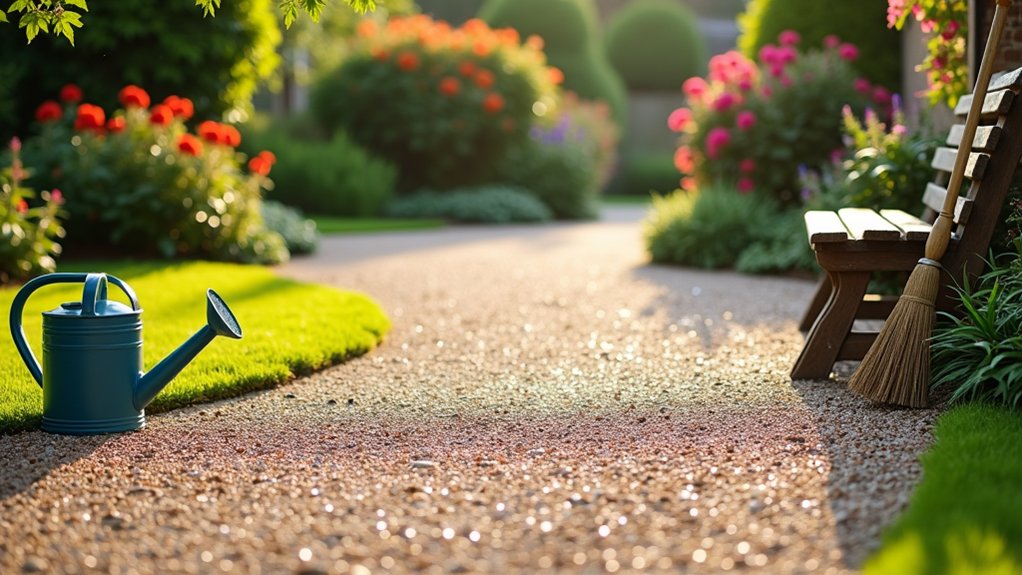Regular brushing keeps resin-bound driveways free from leaves and grit. A medium-pressure wash twice yearly works brilliantly, but mind you don’t get too close with the washer – about a metre’s distance should do. Tackle oil marks or stubborn stains with specialist resin cleaners from your local DIY shop. In autumn, don’t let fallen leaves sit about; they’ll stain the surface. Come winter, use a plastic shovel for snow (metal ones will scratch), and sprinkle a bit of salt if it’s icy. Spring’s the perfect time to check for any wear and tear from the harsh weather. Simple maintenance keeps your driveway looking smart and prevents costly repairs down the line.
Key Takeaways
Simple Steps for Resin-Bound Driveway Care:
- Give your driveway a regular sweep to shift leaves and rubbish – this stops moss taking hold and keeps drainage working properly.
- Deep clean with a pressure washer on a gentle setting to avoid damaging the resin surface. Best done on a dry spring day.
- Keep an eye out for weeds, especially in warmer months. Tackle them early with garden-friendly weedkiller to prevent spreading.
- Check drains and gullies each season, particularly after autumn leaf fall. Clear any blockages to stop water pooling.
- In winter, stick to plastic snow shovels rather than metal ones. Use calcium chloride instead of rock salt for ice – it’s kinder to your driveway and less likely to cause damage.
Understanding the Importance of Regular Cleaning
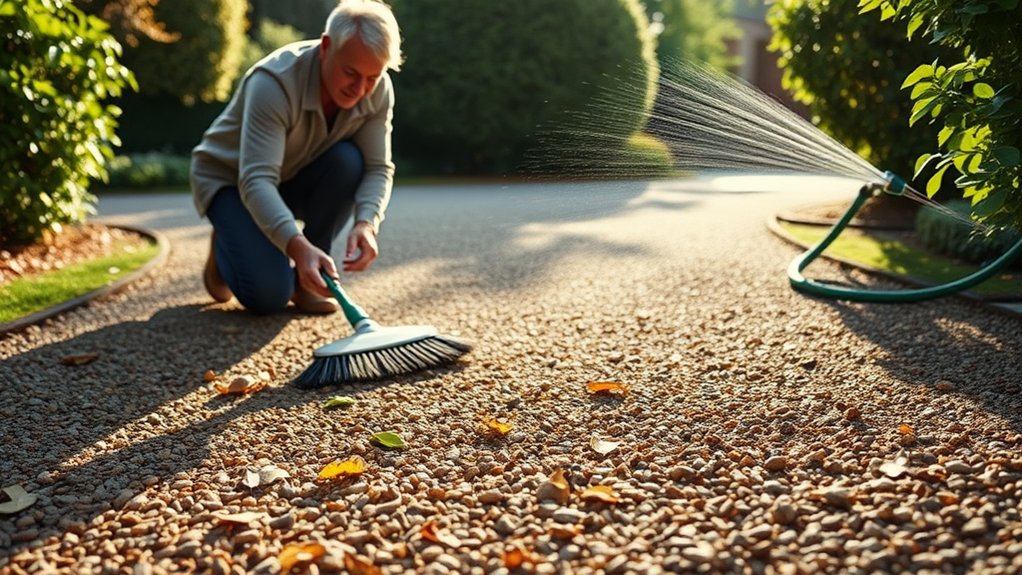
Regular cleaning is essential for keeping your resin-bound gravel driveway in top condition. A quick sweep to clear leaves and debris prevents moss and algae from taking hold, much like keeping your garden path tidy. This simple maintenance keeps your driveway looking smart whilst protecting its colour and surface. Regular cleaning also helps maintain effective drainage capabilities by allowing water to flow freely through the surface.
Think of it like maintaining your car – regular checks prevent bigger problems. When leaves and dirt build up, they can block proper drainage and cause damage underneath. Additionally, regular inspections for early detection of issues can help identify potential problems before they worsen.
Plus, trapped debris acts like sandpaper when walked on, wearing down the surface over time. A well-maintained driveway not only looks better but lasts longer, saving you money in the long run. A weekly sweep and occasional pressure wash is all it takes to protect your investment and keep it looking as good as new.
Effective Sweeping Techniques
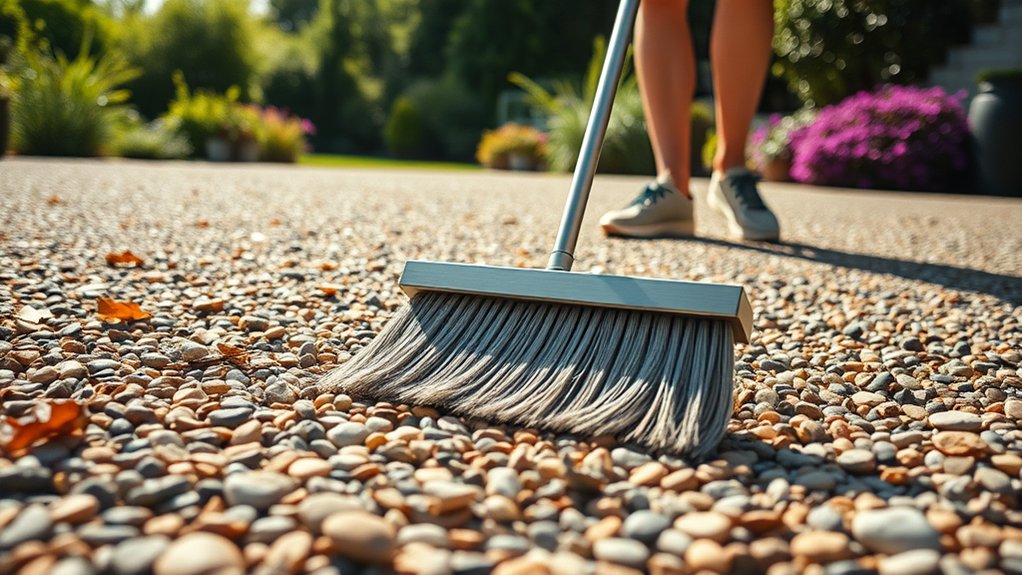
Regular sweeping keeps resin-bound driveways looking smart whilst preserving their condition.
Use a proper stiff-bristled yard brush – not a soft indoor broom – to shift leaves, twigs and other garden bits effectively. Regular cleaning is essential for maintaining the integrity of the surface.
Give it a good sweep once or twice a week, more often during autumn when leaves fall or after stormy weather. Regular sweeping is recommended to prevent weed and moss growth, ensuring the driveway remains in optimal condition.
A thorough sweep now saves hassle with stubborn debris later.
Proper Sweeping Tools
The right tools are essential for sweeping a resin-bound gravel driveway properly. A stiff-bristled broom tackles leaves and everyday debris effectively, whilst specialist sweepers with water jets work brilliantly for deeper cleans. Always choose rubber-edged push brooms to avoid damaging the resin surface. Regular sweeping helps in the fight against moss buildup, ensuring that your driveway remains safe and aesthetically pleasing. Soft brushes work best on delicate spots, and a sturdy leaf rake helps gather larger bits before the main sweep. It’s important to have a full range of resin bound equipment available for maintaining your driveway throughout the seasons. Keep your technique in mind – sweep in one direction and don’t press too hard. These simple steps will keep your driveway looking smart throughout the year.
Regular Sweeping Schedule
Regular sweeping of your resin-bound gravel driveway is vital to prevent debris build-up and maintain its appearance.
Set your sweeping schedule around the seasons – you’ll need to sweep more often during autumn when leaves fall. A stiff-bristled broom works best; sweep at a slight angle in one direction to gather leaves and twigs effectively.
Keep a steady pace to ensure you cover the whole driveway properly. Once you’ve gathered the debris, bin it straight away to stop it blowing back.
Give the surface a light hose-down afterwards to wash away any fine bits. Stick to this routine, and your driveway will stay tidy year-round.
Deep Cleaning With Pressure Washing
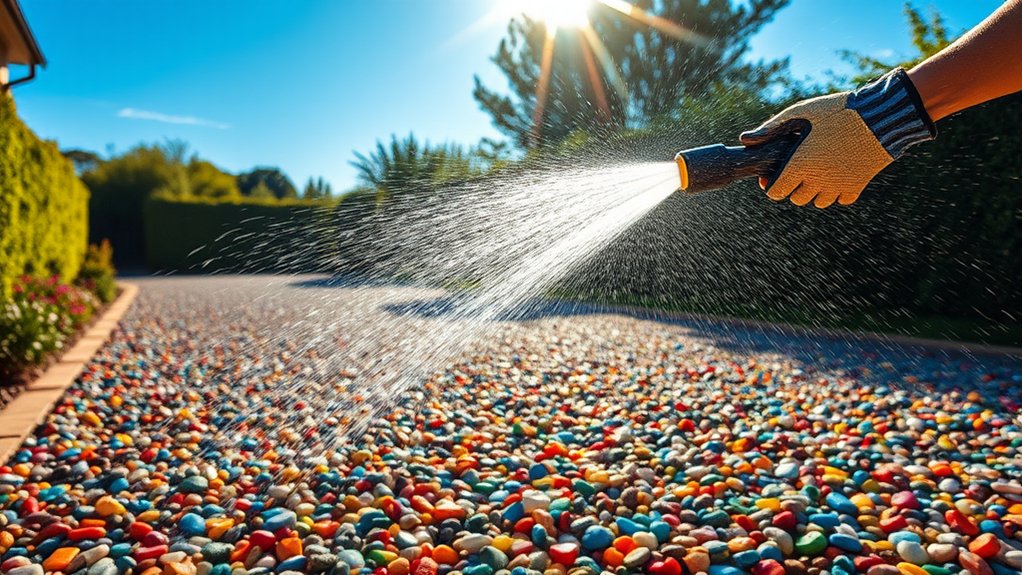
Cleaning your resin-bound gravel driveway requires the correct pressure washer settings to avoid damage whilst ensuring a thorough clean.
Opt for a medium pressure setting (around 2000-2500 PSI) and keep the nozzle at least 30cm from the surface. Work methodically in sections, using a fanning motion to prevent leaving streaks.
Safety is vital – wear protective goggles and non-slip boots, and never point the washer towards people or windows.
Much like washing your car, start with a test patch in a less visible area to check the pressure won’t lift the resin.
Remember to tackle the job on a dry day, as the surface needs proper drying time afterwards.
It’s worth investing in a proper driveway cleaner attachment for the best results – the standard nozzle might be too harsh for resin surfaces.
Pressure Washer Settings
The right pressure washer settings are crucial for cleaning your resin-bound gravel driveway properly.
Choose a washer with adjustable settings and keep the pressure between 80 and 100 bar (1,200-1,500 psi) to prevent damage. Never go above 150 bar, as this risks damaging the surface.
Fit a wide-angle or flat nozzle to spread water evenly across the surface. Keep the nozzle at least 20cm from the driveway – about the length of a standard ruler. A flow rate of 9-13 litres per minute works best for thorough cleaning.
Stick to cold water, as hot water or steam will damage the resin binding.
Before starting, check your driveway for any cracks, as high pressure can make existing damage worse.
Cleaning Techniques Explained
Maintaining your resin-bound gravel driveway needn’t be complicated. Regular cleaning keeps it looking smart and extends its life.
Clean yours with a pressure washer set at 150 bar, using a flat nozzle held 200mm from the surface. Never use steam or hot water, as these will damage the resin.
A weekly sweep and occasional hosing down will shift loose debris before it causes staining. Think of it like caring for your car – little and often is better than waiting until it’s filthy.
These simple steps will prevent moss and algae build-up, keeping your driveway in top condition throughout the British weather.
Safety Precautions Required
Safe pressure washing of resin-bound gravel driveways requires proper precautions.
Use a pressure washer set between 1,000 and 2,500 psi, keeping the nozzle 20 to 200mm from the surface – about the length of your forearm. Choose a flat nozzle to spread the water evenly, much like a garden sprinkler, rather than a harsh jet that could damage the resin.
Essential safety gear includes protective gloves, safety goggles and sturdy, non-slip boots.
Before starting, check the area for any loose stones or debris, and ensure your power cables are safely positioned away from water.
Keep water usage sensible and avoid chemical cleaners, as these can harm both your driveway and local waterways.
Weed Prevention and Management Strategies
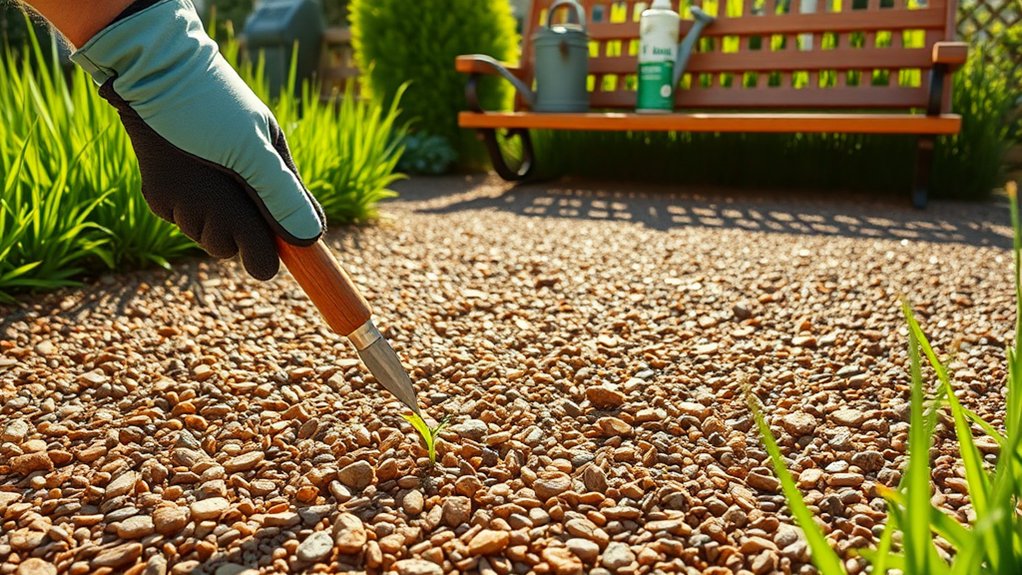
Keeping your resin-bound gravel driveway weed-free takes regular attention but needn’t be complicated.
Lay a proper weed membrane before installation to stop existing seeds from growing through. Check the edges regularly, as that’s where weeds typically creep in first. Natural bark mulch works brilliantly around the borders to keep weeds at bay.
Give the surface a quick sweep and gentle pressure wash now and then to clear any debris where weeds might take root. Spot any seedlings? Simply pull them straight out to prevent damage to the resin.
For extra protection, apply eco-friendly weedkiller once or twice yearly – autumn and spring work best. These simple steps will keep your driveway looking smart throughout the seasons.
Stain Removal Methods for Common Issues
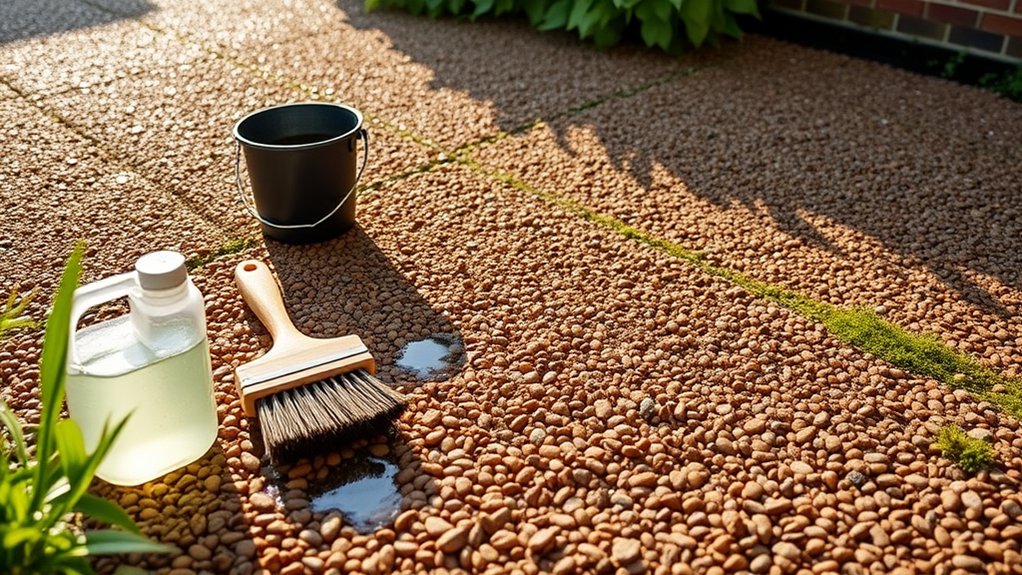
Swift action is vital when tackling stains on your resin-bound gravel driveway to prevent lasting marks.
First, identify the type of stain – common culprits include moss, motor oil and tree sap.
For organic matter like moss, use a proper moss killer or washing-up liquid mixed with water, then scrub with a stiff brush.
Oil spills need a good degreaser – the sort you’d find at any DIY shop – followed by a thorough rinse.
Stubborn cement stains respond well to diluted hydrochloric acid, but always test on a small, hidden area first.
Regular cleaning and quick responses to spills will keep your driveway looking smart.
Seasonal Maintenance Checklist
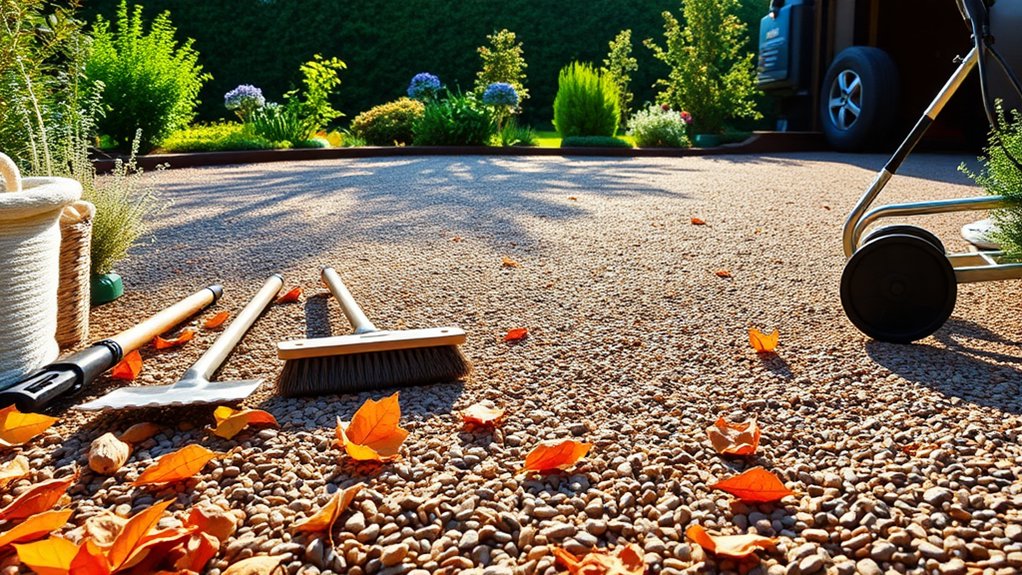
A proper year-round maintenance schedule keeps resin-bound driveways in top shape.
Spring: Clear away winter debris and inspect for damage. Deal with any weeds straight away.
Summer: Regular cleaning is essential. Clean up spills promptly and keep drainage channels clear.
Autumn: Sweep fallen leaves regularly. Keep drainage areas clear to stop moss build-up and maintain water flow.
Winter: Use plastic snow shovels rather than metal ones. Apply calcium chloride for ice, not rock salt. Keep drainage paths free of blockages to prevent water pooling.
Following these seasonal tasks will protect your driveway’s appearance and extend its life.
Frequently Asked Questions
Can I Use a Leaf Blower on My Resin-Bound Driveway?
Using a leaf blower on your resin-bound driveway is perfectly safe and quite practical. It’s a brilliant way to shift autumn leaves, twigs and light debris without the faff of manual sweeping. The strong airflow won’t damage the resin surface, though it’s worth keeping the nozzle a sensible distance away. For best results, tackle the cleaning when the debris is dry – wet leaves tend to stick and might need a bit more effort to shift.
How Long Does a Resin-Bound Driveway Last With Proper Maintenance?
A well-maintained resin-bound driveway typically lasts between 15 to 25 years. Regular upkeep, much like caring for your car, ensures maximum durability. Essential maintenance includes sweeping away debris, cleaning spillages straightaway and resealing every few years – similar to treating a wooden garden fence. Tackle any cracks or damage early on, as small problems can worsen over time, particularly during harsh British winters.
Is It Safe to Park Heavy Vehicles on a Resin-Bound Driveway?
Heavy vehicles on resin-bound driveways warrant caution. Like most surfaces, these driveways have specific weight limits that, when exceeded, can lead to costly damage. Whilst occasional parking of standard vehicles poses no issue, regularly parking lorries, caravans or heavy machinery could compromise the driveway’s structural integrity. Consider checking with your installer about precise weight limitations to avoid unnecessary repair bills.
Can I Apply Sealant to My Resin-Bound Driveway?
You can indeed seal your resin-bound driveway, and it’s a sensible choice for UK weather conditions. Pick a UV-stable sealant that’s specifically made for resin surfaces – your local DIY shop or driveway specialist can recommend suitable brands. Before applying, ensure your driveway is properly cleaned and bone-dry (best done after a few dry days). A single coat with a roller usually does the job, much like painting a wall. Regular sealing every 3-4 years helps protect against our British rain and prevents moss build-up, keeping your driveway looking smart.
What Should I Do if My Driveway Develops Cracks?
Cracks in your driveway need swift attention, much like a chip in your windscreen. Start by giving the surface a thorough check and clean. Then apply suitable repair materials – concrete filler for concrete drives or tarmac repair compound for asphalt surfaces. Regular maintenance helps prevent costly replacements down the line.
Conclusion
Regular maintenance of your resin-bound gravel driveway needn’t be complicated. A bit of routine care goes further than sorting problems after they’ve developed. Keep on top of sweeping, tackle weeds early, and check the surface each season for any wear. A small investment of time will maintain your driveway’s kerb appeal and prevent costly repairs in the long run.
